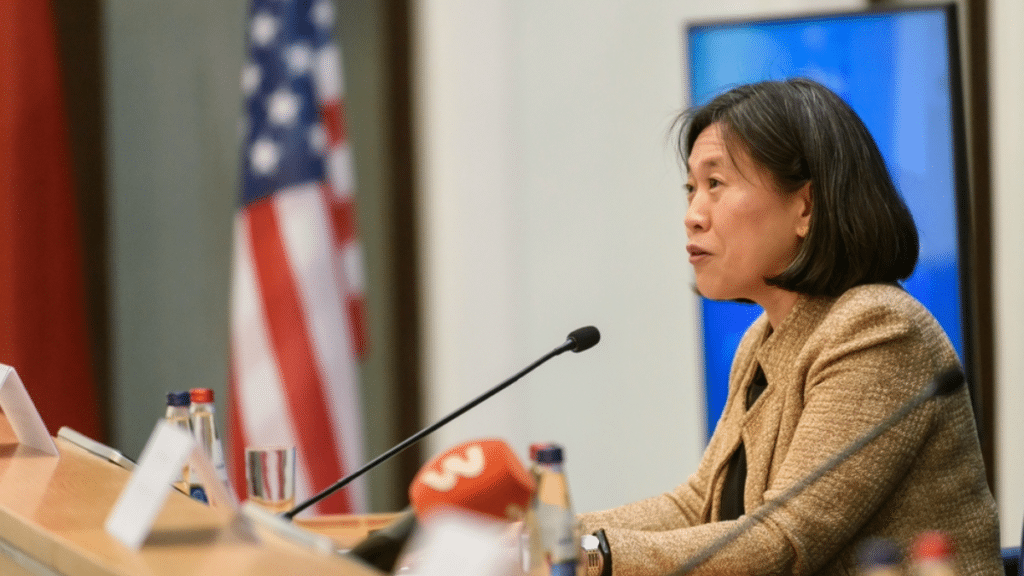Trade Pacts Should Not Have Special Secrecy Guarantees for Source Code & Algorithms
Daniel Rangel, Lori Wallach / Feb 12, 2024
US Trade Representative Katherine Tai at an event in Riga, Latvia, June 2023. Shutterstock
Policymakers around the world are trying to come up with national and international frameworks to regulate the fast-coming age of artificial intelligence (AI). From the European AI Act to the obscure G-7 Hiroshima Process to burgeoning US state-level proposals to scrutinize social media algorithms to protect children, everyone is attempting to come up with the right approach. Driving this activity is a common awareness that we need guardrails that allow us to seize the benefits of powerful AI systems, while ensuring that this technology does not exacerbate economic or racial inequality, increase corporate concentration, threaten our democracies, and more.
Now, imagine that simultaneously trade negotiators who do not understand the intricacies of AI are crafting a binding international agreement that guarantees AI developers absolute secrecy for algorithms and the code through which these are deployed. This secrecy guarantee would ban government regulators’ access to detailed information about the algorithms behind AI tools, in addition to banning code disclosure requirements save the most exceptional cases. Such secrecy guarantees would without a doubt exceed anything provided by any intellectual property legislation in the world.
Well, this is exactly what was happening at the World Trade Organization (WTO) last year. Propelled by the lobbying of the largest tech companies, a subset of WTO nations started negotiations for an “e-commerce” or “digital trade” agreement in 2017. This process, which now includes 90 of the 164 WTO member nations, has provided a pathway for a small group of countries that have included rules favored by the largest digital platforms in their bilateral and regional trade pacts to internationalize and lock in that model.
Some of these proposals would set binding and enforceable constraints on domestic tech policy, affecting online privacy and civil rights, competition rules, AI oversight, and even prospective gig worker policies. The tech lobbyists branded this strategy to internationally preempt legislative bodies and regulatory agencies as “digital trade,” helpfully bragging to a professor studying agency capture about how they created and sold the concept. They managed to steer the Trump administration to include this language in the US-Mexico-Canada Agreement (USMCA) and then submit it as the official US position at the WTO in 2019.
In October 2023, Biden administration trade officials informed the WTO that the US no longer supported four specific versions of the Trump-era “digital trade” rules.
The Biden administration is updating the US approach to “digital trade” rules to ensure that trade agreements do not undercut the many bipartisan congressional proposals to regulate AI, but also digital platforms and services at large, and the agency enforcement actions and executive orders that share the same goals.
Most of the public debate about the Biden move has revolved around international data flows and how the Trump-era terms could undermine data privacy and security regulation.
But the Biden administration also deserves accolades for withdrawing support for the lesser known Trump-era digital trade proposal that would have given tech companies extraordinary secrecy rights over their software’s source code and algorithms, potentially preempting scores of AI regulatory proposals in addition to online civil rights and liberties bills currently being discussed, as well as right to repair policies.
What would the “Source Code” provision have required and why is it so problematic?
The proposed provision would essentially ban government access to software’s source code, and even to detailed descriptions of algorithms, unless and until a court or investigative agency could prove there was a specific problem that merited investigation.
Yet there are countless instances in which government agencies might require ex ante or pre-deployment access to algorithmic information and/or code to prevent wide-scale harms. For instance, there is growing recognition that detailed independent audits or external testing will be important tools to prevent racial, gender, and age discrimination in credit, forensic, employment, and housing software; labor abuses related to the use of surveillance technologies; or algorithmic pricing leading to collusion among competitors.
Moreover, the explosion of large language models has increased policymaker and public interest in oversight for generative AI tools, such as chatbots, that are readily accessible for billions of people and affect how people work, study, vote, and much more. Such oversight is likely to require thorough audits of the models underlying these powerful tools.
The proposed ban on regulatory access in the Source Code proposal would crucially undercut these accountability mechanisms. Banning government regulators’ access to source code and algorithms would be equivalent to having an international agreement that prohibits public health agencies from requiring pharmaceutical companies to disclose the chemical formulas and testing data for a new medicine and instead demanding it be allowed for mass consumption without ensuring its safety.
What’s worse, the specific language that US officials proposed at the WTO in 2019 defined algorithms so broadly that it covered descriptions of algorithms. Thus, this rule would threaten the efforts to adopt pre-deployment evaluations of critical AI systems, such as the algorithmic impact assessments and transparency reporting called for in the Biden administration’s Blueprint for an AI Bill of Rights and the October 2023 AI Executive Order.
The “digital trade” proposal for extraordinary source code and algorithmic secrecy would likewise undermine right to repair laws that require companies to share repair tools – which often includes firmware and “digital keys” – to consumers, farmers and independent repair shops. Such software tools are likely to fall within the scope of the secrecy guarantees.
All Downside, No Upside
There is no justification for special secrecy guarantees just for digital platforms and products. US law does not offer this. Rather, US law provides trade secrets protection for firms’ business-confidential information and for data submitted to government authorities for regulatory purposes.
Only 12 of the 181 agreements with digital trade or e-commerce terms worldwide include source code secrecy guarantees. Those involve Australia, Japan, and Singapore as well as some recent EU deals. The reluctance of most nations engaged in digital trade negotiations to include source code secrecy in their deals reflects this rule’s perils.
The USMCA is the only US deal approved by Congress that includes it. The only other US pact with this term is a US-Japan deal the Trump administration did without Congress’ approval. The many previous US Free Trade Agreements with E-Commerce chapters do not include this term.
Each of the few agreements with a source code secrecy rule is slightly different. As new problems and technologies emerged and regulatory needs expanded, governments realized that they needed to change the language to cover the newly discovered conflicts. Given the speedy development of new AI platforms and related regulatory challenges, it is impossible to project what exceptions will be needed.
For instance, the Trans-Pacific Partnership (TPP), which entered into force largely unchanged among the participating countries minus the US under the name Comprehensive and Progressive Agreement for Trans-Pacific Partnership (CPTPP), exempts software for critical infrastructure and requirements related to patent applications or litigation from its Source Code provision’s secrecy rights.
The TPP text was signed in February 2016. Yet in 2019, one of the main proponents of digital trade rules and a TPP party, Japan, signed a bilateral deal with the EU including a source code provision with even more situations exempted from the rule, particularly related to competition law remedies, intellectual property enforcement, and government procurement.
That same year, the US signed the USMCA, which controversially expanded the reach of the source code provision found in a few pacts to also include algorithms. In terms of exceptions, USMCA negotiators chose to adopt a policy domain-agnostic, but extremely narrow exception for specific investigations, enforcement actions or judicial proceedings.
Oddly, US officials did not include the critical infrastructure software exception from TPP, meaning that general requirements to disclose to regulators certain algorithmic information or code related to critical infrastructure software would be banned by the USMCA language.
The lack of consistency in exceptions and carve-outs in the dozen deals with source code rules is indicative of the myriad policy tools and domains that would be undermined by the digital trade source code and algorithm secrecy rules from which the Biden administration withdrew US support.
Existing WTO Trade Secrets Rules and Other Trade Deals Already Oblige Nations to Protect Business Confidential Information
Industry interests say source code rules are needed to stop foreign governments from passing US firms’ innovations to competitors. However, the WTO’s Agreement on Trade-Related Aspects of Intellectual Property (TRIPS) already requires all WTO nations to protect business confidential information. It covers source code and undisclosed algorithms.
If China and other nations have spent decades flouting the existing WTO trade secrets rules, these countries are not going to change conduct because of new trade-pact terms on paper that say they should provide tech firms more secrecy protections. The actual result would be only to limit US regulators and tech oversight in other countries that do adhere to the rule of law.
Indeed, if the US government is interested in protecting American firms’ technology in the context of Chinese targeted audits and other attempts to force technology transfer, a more promising path would be to enforce the 2020 US-China Phase One Deal. China explicitly committed to prohibit unauthorized disclosure of undisclosed information, trade secrets, or confidential business information shared by firms. That pact also requires Chinese agencies to limit their requests and ensure the security and protection of submitted information.
There is no indication that the US government has attempted to verify compliance with or enforce these commitments. It does not make sense to impose broad new secrecy guarantees prohibiting government regulators’ access to an entire class of information, especially when quite specific protections already in place have never been enforced.
Industry lobbyists have made reviving Trump’s algorithm and source code secrecy guarantees a key priority. Press reports indicate a National Security Council process has been launched to discuss the “digital trade” issue in its entirety.
However, the suggested Source Code term should be completely excluded from the new US digital trade position. It threatens numerous public-interest policy goals. While its downsides are significant, it offers no real upside gains and there is no effective way to “fix” it to limit the downside risks. Trade agreements that cannot be altered but for consensus of all parties are not the place to grant broad new secrecy rights for tech firms, especially given the uncertainties surrounding prospective regulatory needs in this space.
Authors

